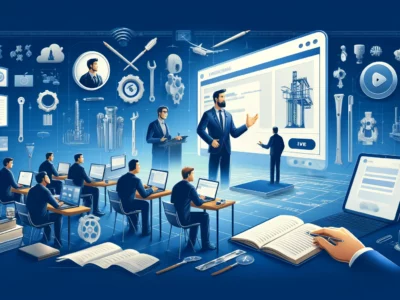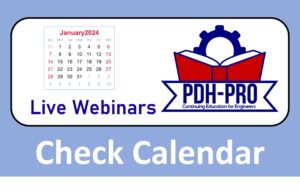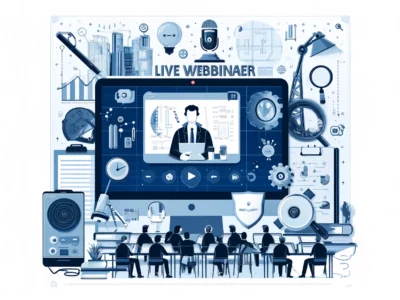Live Engineering Webinars for Professional Engineers
Table of Contents
The growing popularity in engineering webinars for continuing education doesn’t come as a surprise. Any technology that makes life easier — without sacrificing quality — is bound to be successful.
PEs prefer live webinars over other continuing education courses because they consider them to be higher quality, many state boards require them, travel expenses are avoided, they are interactive, and they are very convenient.
This has certainly been the case with continuing education for engineers. Nearly 80% of professional engineers say they have attended at least one webinar, according to an ENR survey conducted in 2016. That was up 9% from 2015 and 37% from 2010. For continuing education providers, webinars have proven to be a highly effective, cost-efficient way of communicating to a targeted audience. For PEs, engineering webinars offer learning opportunities that meet their continuing education requirements in an enjoyable format.
What are Engineering Webinars
Live webinars are a convenient, low-cost, and effective way to engage engineering professionals on crucial educational topics and emerging issues. Most state engineering boards allow PEs to use live webinars to meet their continuing education requirements. Allowing students to interact directly with the instructor and the other participants is a key reason live webinars are the most popular training method among professional engineers. The live format allows instructors the ability to keep their courses up-to-date while allowing them to interact with their students.
Some students learn by hearing and listening. Others learn by reading or seeing pictures. Webinars offer both auditory and visual learning techniques which enhances student learning and retention. Beyond the improved educational value, many people find the presentation format more enjoyable than conventional self-study programs. Having the ability to interact with the instructor and the other participants is another reason many engineers cite for why they prefer engineering webinars over conventional online courses.
For engineers looking to satisfy their professional development hours (PDH), this online format is a good approach.
See for yourself why Webinars are so popular
Curious to know more about webinars? This free On-Demand webinar about compressed gas safety let’s you see why other engineers are asking for more and more of this type of course.
Advantages of Live Engineering Webinars
Webinars offer several advantages compared to of courses offered in a traditional classroom settings or self-directed online courses.
High-quality training from experts: Most engineering continuing education providers hire subject matter experts to teach their online webinars. These experts are typically professional engineers who work as consultants, in industry, or teach at Universities and moonlight as instructors for CEU course providers. At PDH-Pro we only hire subject matter experts who are professional engineers, professional geologists, or experts who hold masters degrees or PhDs. Many instructors are published authors whose works are used at the university level.
Earn PDH and CEU credits: Most states that require continuing education will generally accept live webinars for continuing education credit depending on the nature of the course and the topic. PDH-Pro has taken the time to obtain approval for all live webinars. Many engineers do not consider using live webinars to meet their state’s continuing education requirements because most boards will accept self-directed courses or self-study courses. However, live webinars are an excellent way for professional engineers to meet the renewal requirement and can be a good supplement to other courses.
Interactive training: Live webinars allow participants to speak with the instructor and other students in a manner similar to the traditional classroom setting. The benefits of hearing the instructor speak “live” with a PowerPoint presentation, rather than a recorded seminar or just written materials, include having a more enjoyable experience, improved learning because of the combination of listening and seeing the material, as well as enhanced communication through verbal instruction.
Eliminate travel and lodging expenses: One significant advantage of online live webinars for professional engineers is that they do not require the student to travel. For engineers located in rural areas or those who are not near an engineering college, webinars eliminate the significant expense of having to stay in a hotel. The live webinar model is much more efficient because the time spent traveling to a conventional classroom setting course can be spent participating in the webinar. In today’s fast-paced world where there is never enough time, this can be a significant value.
Course Schedule: Webinars are typically offered more frequently than classroom based courses because they do not require a physical facility to host the event and the instructor does not have to travel. These two factors allow continuing education providers to offer courses more often and at more convenient times of day. Most of our webinars are offered once every 2 to 4 months with a limited number of seats. Check the schedule to see when a webinar is offered. Please check our website before purchase. Registration deadline is 24 hours prior to event – we recommend registering earlier to ensure a slot is available.
CPC Requirements: Accordingly, 42 states now require engineers to fulfill continuing professional competency (CPC) requirements for license renewal. While the number of hours and approval process for courses or activities may vary from state to state, most state licensing boards have modeled their requirements after the NCEES, “Continuing Professional Competency Guidelines”. Professional Development Hours (PDHs) allow engineers to fulfill a different knowledge base and learn things that were not part of the curriculum when they learned their degree.
Certification Through Webinars
 Forty-one states require engineers to complete mandatory continuing education requirements to maintain and renew their professional engineering licenses. Interestingly, only about 400,000 out of 2 million engineers in the United States have taken the time to become licensed in the state in which they practice. Ideally, all engineers should strive to earn their professional engineer status, because only licensed professionals are allowed to offer engineering services to the public and sign and seal plans. Regardless, unlicensed and licensed engineers alike should participate in continuing education to maintain their skills and learn new practices and technologies.
Forty-one states require engineers to complete mandatory continuing education requirements to maintain and renew their professional engineering licenses. Interestingly, only about 400,000 out of 2 million engineers in the United States have taken the time to become licensed in the state in which they practice. Ideally, all engineers should strive to earn their professional engineer status, because only licensed professionals are allowed to offer engineering services to the public and sign and seal plans. Regardless, unlicensed and licensed engineers alike should participate in continuing education to maintain their skills and learn new practices and technologies.
More and more, professional engineers are relying on live webinars to obtain their PDH courses. With widespread availability and their growing popularity, these live presentations are the second most type of online CEU course. The most cited reasons for selecting live webinars are:
- More interesting than reading technical information
- Greater access to course author
- Participation of other students improves focus of course
- Better learning and comprehension
- Nice to share personal experience and opinion with others
Does Your State Board Accept Webinars for Continuing Ed Credit
Several state engineering boards require some or all of an engineer’s continuing education to be delivered by live webinars. The Wisconsin Department of Safety and Professional Services requires 13 PDH hours must be earned through courses where the registrant interacts in real time in a traditional classroom setting, computer conferencing or interactive video conference where participants are present in the same room or logged in at the same time and can communicate directly with each other and ask questions of the instructor. The state of Iowa requires 20 PDH credits in Group 2 Activities where the registrant interacts in real time. The Ohio board requires timed and monitored classes, which includes live webinars, to ensure engineers have adequate contact time with the course material.
How Do Webinars Work
Webinars are similar to classroom lectures – the instructor leads a discussion usually supplemented with a PowerPoint presentation. Rather than having all participants gather together at the same location, the presentation is delivered through the internet using one of several webinar platforms such as GoToMeeting, Skype, or Google Hangouts. This avoids the need for everyone to travel and renting a conference center or classroom, which keeps costs low. Participants can talk and listen throughout the presentation using either their telephone or computer speakers and microphone.
Live Webinars versus Recorded Webinars
Many continuing education providers have started offering both live webinars and recorded webinars for professional engineers. Which format is better? The answer depends on which state the engineering is licensed in and what the learning objectives are for the individual. Some states only accept live webinars or restrict the number of hours that can used to satisfy the continuing education requirements. Live webinars allow the student to ask questions, to hear the thoughts and opinions of the other participants, and refocus the instructor on difficult or confusing subject matter. Recorded webinars allow engineers with busy schedules to earn CEUs when it is convenient.
On-demand webinars, as recorded webinars are also known, are usually less expensive than live webinars and allow engineers to catch up (i.e. complete many courses in a short period of time). The relative value of each format makes both live and recorded webinars a valuable and important tool for professional engineers to use when they are completing their continuing education requirements. In many cases, it comes down to your preference, schedule, and budget in determining which type of webinar is best for your renewal goals.
Another type of recorded webinar is the timed and monitored course. These webinars are recorded versions of live webinars that have been adapted to meet the Ohio engineering boards’ stringent requirements (Ohio R.C. section 4733.151). Ohio professional engineers must earn continuing education credits that are timed and monitored by the course provider. The key criteria include tracking the time spent by the engineer completing the course and providing a certificate of completion that indicates the course is “timed and monitored”.
